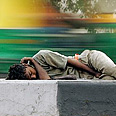
UN advisor: Large part of Jewish community in Argentina lives in poverty
In special interview with Australian Jewish News Agency, renowned economist, sociologist Bernardo Kliksberg analyses affects of socio-economic crisis in Argentina on local Jewish community
Economist and sociologist Bernardo Kliksberg noted that the 2001 Argentine crisis resulted in nearly 40% of Jewish community in Argentina living under the poverty threshold, the Australian Jewish News Agency (AJN) reported Tuesday.
An economist, sociologist and advisor of various international organizations and the UN, Kliksberg warned that since the Argentinean Jewish community could not escape the consequences of the socio-economic crisis that hit Argentina by the end of 2001, a significant sector of the Jewish community is still unable to satisfy its basic needs.
"By mid 2002, 40% of the Jewish community was below the poverty threshold, it is a huge historic record of impoverishment in such a short time," stressed Kliksberg in an interview with AJN.
The analyst noted that there was such despair among Argentinean Jews that "many kids began dropping out of school to go to work."
When analyzing the reasons for the most serious socio-economic crisis faced by Argentina in the last few years, Kliksberg did not hesitate to slam the economic policies of the government during the 1990s.
"Those policies were extremely crucial in the social polarization of the Argentinean society, and there were policies that left small and middle industries unprotected, subject to the competition of subsidized developed economies," he explained.
'Neo-liberal model failed'
The neo-liberal model introduced by then President Carlos Menem, he added, "promoted inequality and at the same time generated poverty, which doubled in less than a decade… The middle class was trapped in between, and the Jewish community is mainly comprised by a small middle class."
Kliksberg, who is a UN advisor for Latin America, noted that Jewish organizations provided "an immediate response."
"Instead of adopting an 'every-man-for-himself' approach or rationalizing Jewish poverty, it became the axis of the community and its institutions. AMIA (Argentine Jewish Association), multiplied its social work, and the charity foundation did a wonderful job," he noted.
Kliksberg also told AJN that "there was active solidarity on the part of the Jewish community of US and Israel."
However, the analyst clarified that "the collective reaction helped mitigate, but not change, the situation", which could only be overcome by means of public policies.
"It is not the community's fault, the country was polarized and the community was polarized. Many Jewish families became the 'new poor' and a very small group, 10% or so, benefited by the situation," he maintained.
Kliksberg noted that the majority of Argentinean Jews were observant and that he himself uses the Torah as his reference book. On many occasions, when advising bankers and businessmen, he noted, he resorts to passages in the Bible.
Finally, Kliksberg emphasized the effect that religious teaching had in the Jewish community, and stressed there is "a high rate of volunteers."
"The State of Israel is the country with the highest number of volunteers in the world in proportion to its population," he said.










